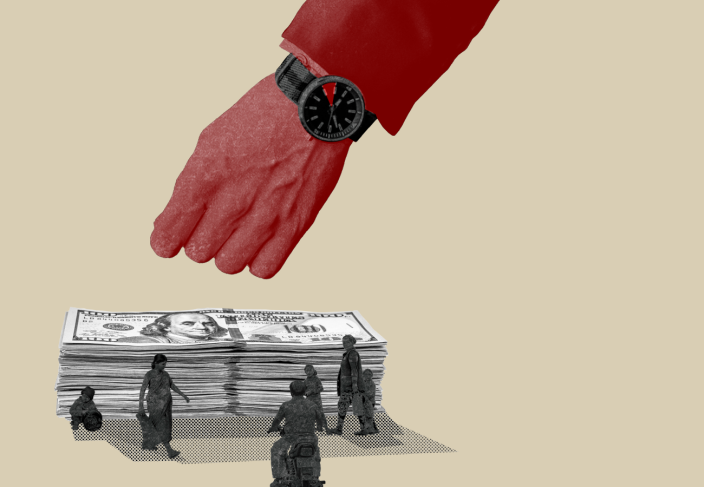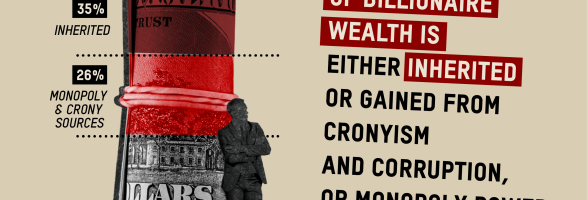For decades Africa has been ensnared in a system of economic manipulation. This has been by design, propped by a colonial architecture that extracts from Africa and obstructs its path to economic transformation. As wealthy beneficiaries of this system convene at the World Economic Forum (WEF) in the pristine streets of Davos, Switzerland, from 20 – 24 January, 2025, they must be unequivocally reminded that a global system that enriches a few wealthy people at the expense of billions living in poverty must fall as it undermines our humanity and the planet. The reset must begin with reforming the international financial and development architecture especially in tax, debt and development finance.
In a milestone event on 7 November, 2024, the United Nations adopted the Terms of Reference that would set forth the real work for a global tax convention. This groundbreaking decision is expected to contribute to transforming the skewed and dysfunctional post-World War II system that has defined economic and development relations between rich countries and Majority World countries, and between the few rich people and the billions living in poverty, as a continuation of the colonial system. Civil society groups are also rallying for a comprehensive and transformative approach to the financing for development ecosystem through similar calls for reform on international development cooperation at the United Nations. Central to these demands is the growing call for UN Conventions on ODA and Debt, respectively, towards ensuring inclusive and democratic governance of global financial architecture.
This push for change also resonates with the African Union. An African Central Bank, an African Monetary Fund, and a continental Mobile Money interoperability[1] are among the innovative financial solutions endorsed by African Heads of State on 21 July 2024 at the 6th Mid- Year Coordination Meeting in Ghana. Unfortunately, many such declarations by African leaders hardly get implemented and therefore neither impact lives nor improve Africa’s place within the global financial system. However, even with the right policy manoeuvres within the continent, a total reset cannot be envisaged without UN reforms, particularly within the Security Council, where Africa—despite its size and significance—remains excluded from permanent membership[2].
This lopsided economic system, rooted in both historical and modern colonial practices, has put more resources and power in rich countries and their elite and less in poorer countries, where it is most needed. According to Oxfam’s 2025 Davos report, $30 million flowed from Africa to the pockets of the richest 1% in rich nations every hour in 2024.
Corporate agents of the colonial system
Sectors such as agriculture and mining- which are the backbone of Africa’s economy realise very little gains in value terms owing to unchecked power and control of multinational corporations . Practices such as price control and unfair wages have been used as instruments in a wider neo-colonialist scheme to disadvantage Africa and poorer countries.
The rise of multinational corporations in monopoly and power is concerning. The world’s five largest corporations are valued higher than the total economic output of Africa, Latin America and the Caribbean combined. They have the power to control price of commodities; supply and production chains for fertilizer; seeds etc, while sidelining indigenous food systems and small holder farmers. There’s need to ensure that a new strategy for agriculture invests in mechanisms to assert accountability in the operations of corporate monopolies. The UN has raised concerns about the opacity of operations of the biggest grain traders who control 70% of the global grain supply. Aggressive tax planning by big corporates asserts the neocolonial playbook that big corporates have so well imbibed. Today Africa loses close to US$89 billion through illicit financial flows primarily from corporate tax dodging and aggressive tax planning.
The quest for justice
There can be no reset of the world order without a systemic reform of the institutional instruments of development finance such as Multilateral Development Banks and of practices of multinational corporations networks with ties to rich countries. Reforms initiated so far, such as the IMF surcharge reviews, are insufficient. Effective 1 November, 2024 the IMF increased borrower interest surcharge thresholds from 187.5% to 300%. While this adjustment offers marginal relief by delaying when surcharge rates are applied, it falls short of addressing the fundamental inequities of the system. Nobel Laureate, Joseph Stiglitz has argued for abolishing the surcharges altogether, as they exacerbate debt traps in poor countries
True change would also require significant shifts in the policies of international financial institutions such as the World Bank and the International Monetary Fund (IMF). Africa is currently reeling under a massive debt burden. Countries spent on average 34% of their revenues on debt servicing in 2024, leaving little resources for social services such as healthcare and education. Meanwhile, ninety-four percent of African countries (44 out of 47 countries) with current World Bank and International Monetary Fund (IMF) loans have cut vital investments in education, health and social protection over the past two years. In 2024, three African presidents from Ghana, Kenya and Zambia [3] "called for 30% of African Sovereign reserves to be put in African Multinational Banks in Africa instead of foreign banks as part of the reforms that must happen.
A new blueprint on international development cooperation and sovereign debt must be situated within the United Nations to allow for voice and representation of poorer countries. This requires dismantling the influence of multilateral institutions rooted in colonial legacies, which for the past sixty-three years have primarily served the interests of former colonial powers. Establishing a more inclusive and equitable system within the UN is the only way for poorer nations to achieve meaningful representation and secure their fair share of global resources.
[1] Mobile money interoperability allows seamless transactions between different mobile money services.
[2] https://www.oxfam.org/en/vetoing-humanity-how-few-powerful-nations-hijacked-global-peace
[3] Three presidents on how to make global finance work better for Africa

